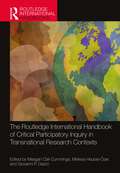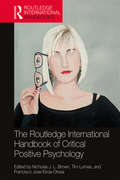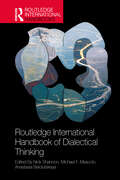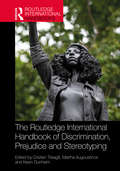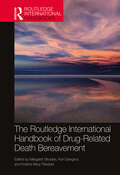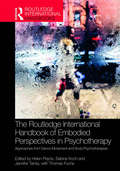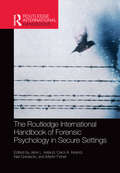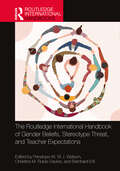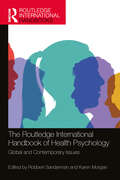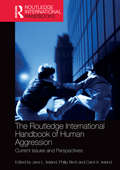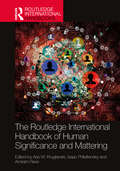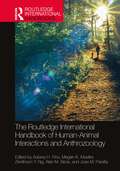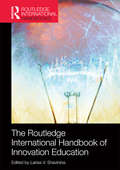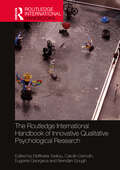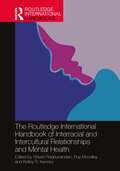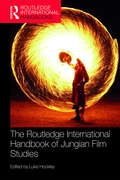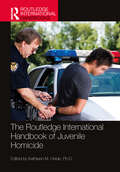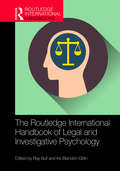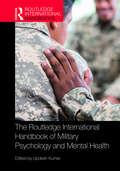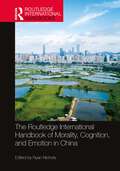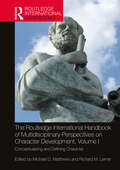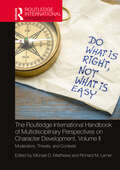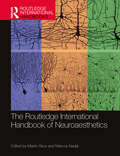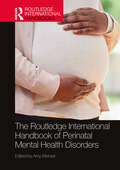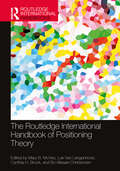- Table View
- List View
The Routledge International Handbook of Critical Participatory Inquiry in Transnational Research Contexts
by Meagan Call-Cummings Giovanni P. Dazzo Melissa Hauber-ÖzerThe Routledge International Handbook of Critical Participatory Inquiry in Transnational Research Contexts illustrates how research guided by the emancipatory epistemology of critical participatory inquiry (CPI) can support social change in transnational contexts, which are inherently laden with unequal power dynamics and colonial structures. It builds on prior volumes in participatory action research, community-based participatory research, and decolonizing methodologies. This edited volume offers cases from across the Global South and Global North and from diverse disciplines including human rights, migration, education, health, youth studies, and development to demonstrate how CPI can fulfill its democratizing and decolonizing potential. Written primarily by new and emerging scholars, practitioners, and community leaders, these cases go on to illustrate how a critical participatory approach to transnational research can enhance the strength of research processes and findings, create more equitable and just experiences for those who participate as co-researchers, and facilitate social change. Providing a valuable framework for transnational CPI and a wealth of examples, it will be an invaluable read for undergraduate and graduate students of Development Studies, Healthcare disciplines, Education, and qualitative research. It will also be of interest to researchers, professionals, community leaders, and even funders and policymakers who want to work toward greater equity and social justice in transnational research contexts.
The Routledge International Handbook of Critical Positive Psychology (Routledge International Handbooks)
by Tim Lomas Nicholas J. Brown Francisco Jose Eiroa-OrosaSince the turn of the twenty-first century, the field of positive psychology has sought to implement a science of human flourishing so that we may lead happier, more fulfilling lives. It has found expression not only in academic papers but also popular books and, increasingly, in government policy. The Routledge International Handbook of Critical Positive Psychology is the first volume dedicated to a critical appraisal of this influential but controversial field of study. The book critically examines not only the scientific foundations of positive psychology, but also the sociocultural and political tenets on which the field rests. It evaluates the current field of knowledge and practice, and includes chapters analysing the methodological constructs of the field, as well as others that question what positive psychology actually means by ideas such as happiness or well-being. Taking the debate further, the book then discusses how positive psychology can be applied in a wider variety of settings than is presently the case, helping communities and individuals by acknowledging the reality of people’s lives rather than adhering strictly to debateable theoretical constructs. Including contributions from disciplines ranging from psychoanalysis to existential therapy, theology to philosophy, and contributors from throughout the world, The Routledge International Handbook of Critical Positive Psychology will be enlightening reading for anyone interested in how psychology has sought to understand human well-being.
The Routledge International Handbook of Dialectical Thinking (Routledge International Handbooks)
by Michael F. Mascolo Nick Shannon Anastasia BelolutskayaThe Routledge International Handbook of Dialectical Thinking is a landmark volume offering a multi-disciplinary compendium of the research, theory and practice that defines dialectical thinking, its importance and how it develops over the lifespan.For the first time, this handbook brings together theory and research on dialectical thinking as a psychological phenomenon from early childhood through the human lifespan. Grounding dialectical thinking in multiple philosophical traditions stemming from antiquity, it explores current psychological models of such thought patterns and shows how these can be applied in everyday life and across multiple disciplines, including philosophy, physics, mathematics and international relations. The handbook explains the nature of dialectical thinking, why it is important and how it can be developed in children and in adults. It concludes with a final chapter depicting a discussion among the authors, exploring the question "how could dialectical thinking be the antidote to dogma"Written by a group of international scholars, this comprehensive publication is an essential reference for researchers and graduate students in psychology and the social sciences, as well as scholars interested in integrating different perspectives and issues from a wide variety of disciplines.
The Routledge International Handbook of Discrimination, Prejudice and Stereotyping (Routledge International Handbooks)
by Cristian Tileagă Martha Augoustinos Kevin DurrheimThis handbook explores prejudice, stereotyping and discrimination primarily as phenomena embedded in the social organization of societies and connected to structural factors and larger societal systems. It offers a unique critical and cross-disciplinary approach to the study of contemporary manifestations of prejudice, stereotyping and discrimination. New socio-psychological analyses of the most pressing social problems of our age bring into view future directions of research on prejudice, stereotyping and discrimination oriented to social change and collective action and that engage with wider systems of norms and discourse. The editors draw on social psychology, sociology, social policy, clinical psychology, cultural studies and feminist, antiracist and decolonizing social science to show how social psychology can successfully rekindle its intellectual dialogue with kindred social science fields to create broader foundations for the exploration of the paradoxes lodged at the heart of the social expression of prejudice in liberal democracies. This is essential reading for anyone interested in prejudice, discrimination and stereotypes. The handbook will be of interest to academics and researchers exploring both the quantitative and qualitative aspects of discrimination, inequality and social exclusion, as well as students undertaking masters or doctoral studies in social psychology, political psychology and political science.
The Routledge International Handbook of Drug-Related Death Bereavement (Routledge International Handbooks)
by Kari Dyregrov Margaret Stroebe Kristine Berg TitlestadThis handbook provides a comprehensive overview of drug-related death bereavement to increase understanding and help direct scientific research, with contributions from across the globe.It is the first comprehensive, cross-cultural, multidisciplinary review of research on drug-related death (DRD)bereavement. Chapters cover the impact of DRD at individual, family, cultural, and societal levels, and topics include working with, and social support for, families following drug-related loss, understanding grief processes of individuals, drug policy, and the importance of cultural contexts. The book also elaborates on methodological issues when researching DRD.This handbook will increase understanding of DRD bereavement and contribute to support for DRD bereaved persons and those who care for them professionally and personally. It is essential reading for professionals and academics in the field as well as anyone affected by DRD.
The Routledge International Handbook of Embodied Perspectives in Psychotherapy: Approaches from Dance Movement and Body Psychotherapies (Routledge International Handbooks)
by Thomas Fuchs Jennifer Tantia Helen Payne Sabine KochThere is a growing interest in embodied approaches to psychotherapy internationally. This volume focuses on the respective focal professions of dance movement psychotherapy (DMP) and body psychotherapy (BP), addressing the psychotherapeutic need for healing throughout the lifespan. Within embodied clinical approaches, the therapist and client collaborate to discover how the body and movement can be used to strengthen positive relational skills, attending to the client's immediate and long-term needs through assessment, formulation, treatment and evaluation. Both DMP and BP are based upon the capacity and authority of the body and non-verbal communication to support and heal patients with diverse conditions, including trauma, unexplained bodily symptoms and other psychological distress, and to develop the clients’ emotional and relational capacities by listening to their bodies for integration and wellbeing. In The Routledge International Handbook of Embodied Perspectives in Psychotherapy, world leaders in the field contribute their expertise to showcase contemporary psychotherapeutic practice. They share perspectives from multiple models that have been developed throughout the world, providing information on theoretical advances and clinical practice, as well as discourse on the processes and therapeutic techniques employed individually and in groups. Presented in three parts, the book covers underpinning embodiment concepts, potentials of dance movement psychotherapy and of body psychotherapy, each of which is introduced with a scene-setting piece to allow the reader to easily engage with the content. With a strong focus on cross- and interdisciplinary perspectives, readers will find a wide compilation of embodied approaches to psychotherapy, allowing them to deepen and further their conceptualization and support best practice. This unique handbook will be of particular interest to clinical practitioners in the fields of body psychotherapy and dance movement psychotherapy as well as professionals from psychology, medicine, social work, counselling/psychotherapy and occupational therapy, and to those from related fields who are in search of information on the basic therapeutic principles and practice of body and movement psychotherapies and seeking to further their knowledge and understanding of the discipline. It is also an essential reference for academics and students of embodied psychotherapy, embodied cognitive science and clinical professions.
The Routledge International Handbook of Forensic Psychology in Secure Settings (Routledge International Handbooks)
by Carol A. Ireland Jane L. Ireland Martin Fisher Neil GredeckiThe Routledge International Handbook of Forensic Psychology in Secure Settings is the first volume to identify, discuss and analyse the most important psychological issues within prisons and secure hospitals. Including contributions from leading researchers and practitioners from the UK, US, Australia and Canada, the book covers not only the key groups that forensic psychologists work with, but also the treatment options available to them, workplace issues unique to secure settings, and some of the wider topics that impact upon offender populations. The book is divided into four sections: population and issues; treatment; staff and workplace issues; contemporary issues for forensic application. With chapters offering both theoretical rigour and practical application, this is a unique resource that will be essential reading for any student, researcher or practitioner of forensic psychology or criminology. It will also be relevant for those interested in social policy and social care.
The Routledge International Handbook of Gender Beliefs, Stereotype Threat, and Teacher Expectations (Routledge International Handbooks of Education)
by Christine M. Rubie-Davies Bernhard Ertl Penelope W. St J. WatsonThe Routledge International Handbook of Gender Beliefs, Stereotype Threat, and Teacher Expectations presents, for the first time, the work of leading researchers exploring the synergies and interrelationships between these fields, and provides a catalytic platform for advancing theory, practice, policy and research from an integrated perspective. An understanding of how gender beliefs, stereotype threat, and teacher expectations interrelate is vital to creating safe, equitable, and encouraging learning spaces. The collection summarises how gender beliefs, stereotype threat, and teacher expectations act in association to influence gendered student achievement, engagement, and self-beliefs, and suggests ways toward rectifying their negative effects. The chapters are organised into four sections: Gender Beliefs, Identity, Stereotypes, and Student Futures Stereotype Threat Teacher Expectations Synergies and Solutions By examining synergies and solutions shared between the three fields, this book creates more meaningful, consistent, and permanent approaches to achieving gender identity safety, gendered scholastic equity, well-being, and positive futures for students. This comprehensive publication brings together cutting-edge research at the intersection of gender beliefs, stereotype threat, and teacher expectations. It is an essential reference for researchers and postgraduate students in education and gender studies as well as educational, social, and developmental psychology.
The Routledge International Handbook of Health Psychology: Global and Contemporary Issues (Routledge International Handbooks)
by Karen Morgan Robbert SandermanThis state-of-the-art handbook provides authoritative, up to date coverage of health psychology topics, offering an excellent, in-depth view of the field. Leading experts provide essential insights into the discipline of health psychology, its roots, future directions, and the networks and organisations involved.Structured into eight parts, the book starts with defining health psychology including an important historical overview. Subsequent sections examine theories and methodology, health behaviour, interpersonal relations and health, chronic disease and interventions. The concluding sections tackle the important areas of global health psychology and the future of Health Psychology. The editors and auditors include leading experts in the field as well as early career researchers from over 20 countries across the world. Global representation was a key goal in selecting authors.While familiar areas receive ample attention this book strives to put the field of health psychology in context. As well as examining history it book spotlights global issues and explicitly mentions future developments and opportunities. The role of health psychology in the COVID-19 pandemic is considered and there is discussion more broadly on how health psychology can contribute to addressing societal challenges, including how to move forward sharing knowledge more firmly with policymakers.This is an essential resource for scholars, PhD students and research master students specialising in the field of health psychology.
The Routledge International Handbook of Human Aggression: Current Issues and Perspectives (Routledge International Handbooks)
by Jane L. Ireland, Philip Birch and Carol A. IrelandDrawing upon international expertise, and including some of the most well-known academics and practitioners in the field, The Routledge International Handbook of Human Aggression is the first reference work to fully capture how our understanding of aggression has been refined and reconceptualised in recent years. Divided into five sections, the handbook covers some of the most interesting and timely topics within human aggression research, with analysis of both indirect and direct forms of aggression, and including chapters on sexual aggression, workplace bullying, animal abuse, gang violence and female aggression. It recognises that, in many cases, aggression is an adaptive choice rather than a moral choice. Providing practitioners and academics with an up-to-date resource that covers broad areas of interest and application, the book will be essential reading for students, researchers and practitioners associated with a range of social science disciplines, including psychology, criminology, social work and sociology, particularly those with an interest in developmental, organisational, forensic and criminal justice allied disciplines.
The Routledge International Handbook of Human Significance and Mattering (Routledge International Handbooks)
by Isaac Prilleltensky Arie W. Kruglanski Amiram RavivThis innovative book addresses the need for significance and mattering as a universal human motivation. It examines the impact of significance and mattering, considering how they manifest across our lifespan and in different parts of our lives.Written by a team of eminent authors with expertise in diverse psychological fields, the book explores how significance and mattering extend to almost all social domains, including families, schools, colleges, groups, workplaces, communities, and nations. The book is divided into four main parts, which consider the impact of significance and mattering across the life span, across life domains, across societies and cultures, and in mental health. The chapters outline how significance and mattering power race and gender politics, shape attitudes toward immigration, drive violent extremism, and underlie mental health issues, such as loneliness, and narcissism. The book considers the quest for significance as a fundamental motive in our personal interactions and in how society operates as a whole.Providing a truly comprehensive coverage of a ubiquitous psychological dynamic that affects all aspects of our lives, this book will be highly relevant for researchers, academics, practitioners, and students in psychology, social sciences, education, social work, and therapeutic professions. In addition, the book should appeal to organizational, political, and community leaders and the general public interested in human behavior and social problems.
The Routledge International Handbook of Human-Animal Interactions and Anthrozoology (Routledge International Handbooks)
by Aubrey H. Fine Alan M. Beck Jose M. Peralta Megan K. Mueller Zenithson Y. NgThis diverse, global, and interdisciplinary volume explores the existing research, practice, and ethical issues pertinent to the field of human-animal interactions (HAIs), interventions, and anthrozoology, focusing on the perceived physical and mental health benefits to humans and the challenges derived from these relationships. The book begins by exploring the basic theoretical principles of anthrozoology and HAI, such as the evolution and history of the field, the importance of language, the economic costs and current perspectives to physical and mental wellbeing, the origins of domestication of animals, anthropomorphism, and how animals fit into human societies. Chapters then move onto practice, covering topics such as how animals help childhood and adulthood development, pet ownership, disability, the roles of pets for people with psychiatric disorders, the links between animal and domestic abuse, and then more widely into the therapeutic roles of animals, animal-assisted therapies, interactions outside the home, working animals, animals in popular culture, and animals in research, for leisure, and food. Including chapters on a wide range of animals, from domesticated pets to wildlife, this collection examines the benefits yet also reveals the complexity, and often dark side, of human-animal relations. Interweaving accessible commentaries with revealing chapters throughout the text, this collection would be of great interest to students and practitioners in the fields of mental health, psychology, veterinary medicine, zoology, biology, social work, history, and sociology.
The Routledge International Handbook of Innovation Education (Routledge International Handbooks Of Education Ser.)
by Larisa V. ShavininaThe Routledge International Handbook of Innovation Education is the international reference work on innovation education and potentially opens an entirely new direction in education. The overall goal of the handbook is to address the question of how to develop innovators in general and how to develop the innovative potential of today‘s young people
The Routledge International Handbook of Innovative Qualitative Psychological Research (Routledge International Handbooks)
by Brendan Gough Carolin Demuth Eleftheria Tseliou Eugenie GeorgacaThe contemporary world currently faces multi-level challenges, including cross-border migration, economic crises and myriad health issues, including the recent COVID-19 pandemic. Within this wider context of ongoing fluidity, transition and diversity, qualitative research methodologies in psychology are rapidly evolving, featuring innovative ways to examine the dynamic interrelation of societal and psychological processes. The Routledge International Handbook of Innovative Qualitative Psychological Research sets the stage for cutting-edge debates on how innovative approaches in qualitative research in psychology can contribute to tackling current challenges in our society. The handbook depicts innovation in qualitative research in psychology with respect to methodological approaches like visual methods, arts-based research, discursive and narrative approaches, multimodal approaches, and pluralistic/mixed methodology approaches. It addresses a wide range of contemporary, challenging topics at the intersection of the psychological with the societal sphere, like globalization, climate change, digitalization, urbanization, social marginalization, gender and sexism, youth cultures, global mobility and global health risks. The book also includes contributions from various European countries across different fields of psychology, like clinical, health, social, educational, environmental, developmental, organizational, political and media psychology. This is a valuable text for anyone teaching qualitative research courses in psychology as well as in related disciplines like mental health, education and sociology. It will also be of great interest to any qualitative researcher in the behavioral and social sciences wishing to have an overview of the latest developments in the field.
The Routledge International Handbook of Interracial and Intercultural Relationships and Mental Health (Routledge International Handbooks)
by Roy Moodley Shivon Raghunandan Kelley R. KenneyThe Routledge International Handbook of Interracial and Intercultural Relationships and Mental Health presents critical, theoretical, empirical, and psychological accounts of intercultural intimacies.It challenges pervasive Eurocentric discourse and ideas and offers current, scholarly, practical, equitable, global, and intercultural responsive philosophies, theories, clinical frameworks, and practices. The chapters in this text offer critical perspectives on the mental health and well‑being of intercultural couples, inclusive of multi‑cultural, multi‑ethnic, multi‑faith, multi‑sexual, multi‑racial, multi‑gendered, multi‑abled couples, and their intersections. A diverse range of international contributors present an intersectional analysis of traditional and contemporary cultural ideas and relationship philosophies and explore multiple global and cultural psychologies that shape the health and well‑being of intercultural couples and their families.This handbook is essential for students, educators, mental health clinicians, and researchers in counselling, psychotherapy, clinical psychology, psychiatry, and social work programmes.
The Routledge International Handbook of Jungian Film Studies (Routledge International Handbooks)
by Luke HockleyThe Routledge International Handbook of Jungian Film Studies weaves together the various strands of Jungian film theory, revealing a coherent theoretical position underpinning this exciting recent area of research, while also exploring and suggesting new directions for further study. The book maps the current state of debates within Jungian orientated film studies and sets them within a more expansive academic landscape. Taken as a whole, the collection shows how different Jungian approaches can inform and interact with a broad range of disciplines, including literature, digital media studies, clinical debates and concerns. The book also explores the life of film outside cinema - what is sometimes termed ‘post-cinema’ - offering a series of articles exploring Jungian approaches to cinema and social media, computer games, mobile screens, and on-line communities. The Routledge International Handbook of Jungian Film Studies represents an essential resource for students and researchers interested in Jungian approaches to film. It will also appeal to those interested in film theory more widely, and in the application of Jung’s ideas to contemporary and popular culture.
The Routledge International Handbook of Juvenile Homicide (Routledge International Handbooks)
by Kathleen M. HeideThe Routledge International Handbook of Juvenile Homicide is the definitive work on juvenile homicide. This volume provides an up-to-date, comprehensive, and in-depth exploration of what is known about juveniles involved in murder. Taking an interdisciplinary approach to juvenile homicide, this handbook brings together the leading experts in social sciences, mental health, and law from many countries. The volume covers the phenomenon of juvenile homicide from beginning to end, by addressing the questions “why do kids kill?” all the way to “how does society stop them from killing?”. The tough issues involved in sentencing youths who take the lives of others, often deliberately and in horrific ways, are confronted through chapters addressing the legal issues, child development factors, risk assessment, public attitudes, and ethical concerns. The volume brings together research specifically conducted for this volume, in addition to summaries and discussions of clinical and empirical findings. Each chapter ends with key takeaway points. Contributors include psychologists, psychiatrists, criminologists, sociologists, lawyers, economists, biologists, epidemiologists, and public health and public policy experts. Uniquely, they examine murder by juveniles across the globe. The volume includes research pertaining to the causes, correlates, and theoretical explanations of juvenile homicide offending. Moving beyond discussions of juvenile homicide offenders (JHOs) as a homogenous group, the volume includes research on specific types of JHOs and research investigating age and gender differences among JHOs. In addition, it draws attention to the empirical factors associated with juvenile homicide offending, effective treatment of JHOs, recidivism, and prevention of violent behavior. The volume also makes recommendations for policy and practice, including how to shift government policy from punishing lawbreakers to saving lives. This volume is essential reading for scholars and students researching youth violence/juvenile homicide across a variety of disciplines including criminology, criminal justice, law, psychology, psychiatry, sociology, social work, public health, and education. It is also an invaluable reference for mental health professionals, practitioners in the juvenile and criminal justice systems, policymakers, and government leaders.
The Routledge International Handbook of Legal and Investigative Psychology (Routledge International Handbooks)
by Ray Bull Iris Blandón-GitlinThe Routledge International Handbook of Legal and Investigative Psychology explores contemporary topics in psychological science, applying them to investigative and legal procedures. Written by recognized scholars from around the globe, this book brings together current research, emerging trends, and cutting-edge debates in a single comprehensive and authoritative volume. Drawing from both research and practice, this handbook highlights many important issues such as: how to investigate and prosecute rape; the value of emotional affect in homicide investigations; and factors affecting jurors’ and suspects’ decision making. By considering current research, the authors inform both legal and investigative professionals of findings that are of direct relevance to them, and the steps that can be taken to improve efficiency. This collection will inform investigative and legal professionals, advanced psychology students, academics, researchers, and policy makers. It will also be of great interest to researchers from other disciplines, including criminology, policing, and law.
The Routledge International Handbook of Military Psychology and Mental Health (Routledge International Handbooks)
by Updesh KumarMilitary psychology has become one of the world’s fastest-growing disciplines with ever-emerging new applications of research and development. The Routledge International Handbook of Military Psychology and Mental Health is a compendium of chapters by internationally renowned scholars in the field, bringing forth the state of the art in the theory, practice and future prospects of military psychology. This uniquely interdisciplinary volume deliberates upon the current issues and applications of military psychology not only within the military organization and the discipline of psychology, but also in the larger context of its role of building a better world. Split into three parts dedicated to specific themes, the first part of the book, "Military Psychology: The Roots and the Journey," provides an overview of the evolution of the discipline over the years, delving into concepts as varied as culture and cognition in the military, a perspective on the role of military psychology in future warfare and ethical issues. The second part, "Soldiering: Deployment and Beyond," considers the complexities involved in soldiering in view of the changing nature of warfare, generating a focal discourse on various aspects of military leadership, soldier resilience and post-traumatic growth in the face of extreme situations, bravery and character strengths and transitioning to civilian life. In the final section, "Making a Choice: Mental Health Issues and Prospects in the Military," the contributors focus on the challenges and practices involved in maintaining the mental health of the soldier, covering issues ranging from stress, mental health and well-being, through to suicide risk and its prevention, intervention and management strategies, moral injury and post-traumatic stress disorder. Incorporating enlightening contributions of eminent scholars from around the world, the volume is a comprehensive repository of current perspectives and future directions in the domain of military psychology. It will prove a valuable resource for mental health practitioners, military leaders, policy-makers and academics and students across a range of disciplines.
The Routledge International Handbook of Morality, Cognition, and Emotion in China (Routledge International Handbooks)
by Ryan NicholsThis ground-breaking handbook provides multi-disciplinary insight into Chinese morality, cognition and emotion by collecting in one place a comprehensive collection of essays focused on Chinese morality by world-leading experts from more than a dozen different academic fields of study. Through fifteen substantive chapters, readers are offered a holistic look into the ways morality could be interpreted in China, and a broad range of theoretical perspectives, including ecological, anthropological and cultural neuroscience. Offering a syncretic, multi-disciplinary overview that moves beyond the usual western-oriented perspective of China as a monolithic culture, research questions addressed in this book focus on morality as represented at the level of the individual, rather than at the group or institutional levels. Research questions explored herein include: What are the major contours of distinctively Chinese morality? What was the role of the ancient ecology, climate, and pathogen load in producing Chinese moral attitudes and emotions? Are ingredients of the good life in China different than ingredients of the good life elsewhere? How are children in China morally educated? How do findings from cultural neuroscience help us understand differences in the treatment of family members, or the treatment of strangers, in China and elsewhere? How do the protests in Hong Kong participate in, or stand apart from, the ongoing ethics of protest in historical China? The clear structure and accessible writing offer a rigorous assessment of the ways in which morality can be interpreted, shedding light on differences between China and Western cultures. The book also provides a timely window into Chinese forms of morality, and the pivotal role these play in social organization, family relationships, systems of government, emotion and cognition. Representing fields of study ranging from philosophy, linguistics, archaeology, history, and religion, to social psychology, neuroscience, clinical psychology, developmental psychology, and behavioral ecology, this is an essential text for students, academics, and others with wide interest in Chinese culture.
The Routledge International Handbook of Multidisciplinary Perspectives on Character Development, Volume I: Conceptualizing and Defining Character (Routledge International Handbooks)
by Richard M. Lerner Michael D. MatthewsDrawing from philosophy, religion, biology, behavioral and social sciences, and the arts, The Routledge International Handbooks of Multidisciplinary Perspectives on Character Development, Volumes I and II, present cutting-edge scholarship about the concept of character across the life span, the developmental and contextual bases of character, and the key organizations of societal sectors, within and across nations, that promote character development in individuals, families, and communities.This first volume, Conceptualizing and Defining Character, explores the foundations of the field by providing an array of interdisciplinary approaches to character development, including economics, education, law, literature, military science, philosophy, and many more. With contributions from international experts, Volume I brings together cutting-edge research and discusses instances of character development, including civic character, courage, fairness, forgiveness, gratitude, morality, tolerance, and thankfulness.This comprehensive publication is an essential reference for researchers and graduate students in behavioral sciences, biology, philosophy, theology, and economics, as well as practitioners leading or evaluating character education or character development programs around the world.Find Volume II: Moderators, Threats, and Contexts here: www.routledge.com/9781032172453
The Routledge International Handbook of Multidisciplinary Perspectives on Character Development, Volume II: Moderators, Threats, and Contexts (Routledge International Handbooks)
by Richard M. Lerner Michael D. MatthewsDrawing from philosophy, religion, biology, behavioral and social sciences, and the arts, The Routledge International Handbooks of Multidisciplinary Perspectives on Character Development, Volumes I and II, present cutting-edge scholarship about the concept of character across the life span, the developmental and contextual bases of character, and the key organizations of societal sectors, within and across nations, that promote character development in individuals, families, and communities.This second volume, Moderators, Threats, and Contexts, focuses on the moderators and covariates of character development with chapters pertaining to cultural- and contextual-based exemplars of character development; grit, achievement, and resilience; hope for the future; and parenting and self-regulation. With contributions from international experts, Volume II goes on to discuss threats to moral, positive, or virtuous character development, as well as the different contexts wherein the character is studied and promoted. Special attention is paid to the centers of excellence at universities around the world that specialize in character development research and character education.This comprehensive publication is an essential reference for researchers and graduate students in behavioral sciences, biology, philosophy, theology, and economics, as well as practitioners leading or evaluating character education or character development programs around the world.Find Volume I: Conceptualizing and Defining Character here: www.routledge.com/9781032169491
The Routledge International Handbook of Neuroaesthetics (Routledge International Handbooks)
by Martin Skov Marcos NadalThe Routledge International Handbook of Neuroaesthetics is an authoritative reference work that provides the reader with a wide-ranging introduction to this exciting new scientific discipline. The book brings together leading international academics to offer a well-balanced overview of this burgeoning field while addressing two questions central to the field: how the brain computes aesthetic appreciation for sensory objects and how art is created and experienced. The editors, Martin Skov and Marcos Nadal, have compiled a neuroscientific, physiological, and psychological overview of the systems underlying the evaluation of sensory objects and aesthetic appreciation. Covering a variety of art forms mediated by vision, audition, movement, and language, the handbook puts forward a critical review of the current research to explain how and why perceptual and emotional processes are essential for art production. The work also unravels the interaction of art with expectations, experience and knowledge and the modulation of artistic appreciation through social and contextual settings, eventually bringing to light the potential of art to influence mental states, health, and well-being. The concepts are presented through research on the neural processes enabling artistic creativity, artistic expertise, and the evolution of symbolic cognition. This handbook is a compelling read for anyone interested in making a first venture into this exciting new area of study and is best suited for students and researchers in the fields of neuroaesthetics, perceptual learning, and cognitive psychology.
The Routledge International Handbook of Perinatal Mental Health Disorders (Routledge International Handbooks)
by Amy WenzelThe Routledge International Handbook of Perinatal Mental Health Disorders comprehensively presents the leading, global research in understanding and clinically treating perinatal mental health disorders.In this wide-ranging book, Wenzel invites a global community of scholars and practitioners working in perinatal mental health to discuss contemporary empirical research in the field and how this can be applied in practice. Presented in five parts, the book begins by laying out the historical context of the field before exploring prenatal and postpartum mental health disorders, such as depression, anxiety, alcohol and drug misuse, eating disorders, and insomnia. Chapters describe different interventions, such as mindfulness-based interventions, integrative interpersonal psychotherapy, and cognitive behavioral therapy, before addressing specific special issues, such as fathers’ experiences, 2SLGBTQ+ individuals, and perinatal mental health disorders in migrant women. Designed to have international relevance, each chapter includes case studies and sections on cultural considerations, and clinical dialogue is used throughout to illustrate specific applications of contemporary empirical research to clinical practice.This handbook is essential reading for clinicians who have an interest in issues associated with perinatal mental health disorders, as well as students of clinical social work, clinical psychiatry, clinical psychology, obstetrics and gynecology, nursing, and midwifery.
The Routledge International Handbook of Positioning Theory (Routledge International Handbooks)
by Luk Van Langenhove Cynthia H. Brock Mary B. McVee Bo Allesøe ChristensenThis handbook is the first of its kind to explore Positioning Theory. Taking inspiration from the groundwork set by Rom Harré and collaborators such as Bronwyn Davies, Fathali Moghaddam, Luk Van Langenhove, and others the book explores the emergence, historical context, and disciplinary applications of Positioning Theory and its basic precepts as a social psychological theory.This volume encompasses over 20 chapters across four sections, assimilating cross-disciplinary insights that try to understand the theoretical underpinnings, methodological applications, and contemporary relevance of Positioning Theory. Part 1 explores the movement of scholarly figures and their numerous works on the subject. It discusses the foundational origins and the historical contexts of the existing theories on positioning and new directions for scholarship. Part 2 examines the methodological and narrative investigations used for data analysis in positioning research, navigating through the epistemological orientations and theoretical landscapes of Positioning Theory. Part 3 explores numerous applications across disciplines to consider the reach and influence of positioning within and across multiple disciplines. Lastly, the authors contemplate the future directions for Positioning Theory.Featuring researchers from leading research institutions from across the globe, the book is important reading for scholars interested in positioning and Positioning Theory. We recommend this handbook for graduate-level courses in social psychology, communication, discourse studies and related disciplines.
